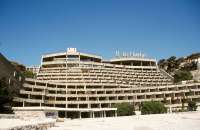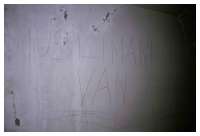Hotel Libertas, 2003 Peter Friedl
Upon invitation from Catherine David, curating an exhibition for the Museum of Modern Art in Dubrovnik, a series of altogether six lectures and presentations took place in 2002/03. In connection with my stay and lecture in Dubrovnik, the plan for the following project emerged.
The site is the ruins of the Hotel Libertas in Dubrovnik, several hundred meters outside the historical city walls of the old town. Located directly on the bay, this abandoned hotel building is a special type of witness to history. For one, the terrace-shaped building from the late 1960s recalls how the leisure and tourist industry's ideas of happiness were architecturally implemented—for example on the Dalmatian coast—and, accordingly, brutalized. On the other hand, the hotel’s heavily damaged state points to the traumatic siege of Dubrovnik by the so-called Yugoslavian army at the beginning of the 1990s; the hotel was also among the victims felled by their grenade attacks. (Images of the old town’s destruction circulated the globe, among them was the sequence of photos from Pavo Urban, who was killed in an attack in December 1991). Although the war has already slipped from memory and official politics are geared towards normality, investments, restoration, and tourism, this ruin appears—shortly before the next phase of investment—like a history-infected, monument for a time. In the meantime, it seems so out of place, that even the traces of its temporary sub-cultural function, as evident by the abundant graffiti, are now mere anachronistic relics.
In Dubrovnik, “Libertas” is an omnipresent linguistic indication of the long and skillfully aestheticized tradition of freedom of this once independent coastal republic, which, as is well known, remained largely independent from the Middle Ages into the nineteenth century.
Shakespeare’s comedy Twelfth Night, or What You Will plays in Illyria. The play begins: “Scene: A City in Illyria; and the Sea-coast near it.” Referred to, is today’s Croatian Dalmatian coast, and the imagined city easily could have been Ragusa (Dubrovnik). Among the characters in the piece are the Duke Orsino, the Countess Olivia, the shipwrecked siblings Viola and Sebastian, the steward Malvolio and Feste, the clown. Among Shakespeare scholars, Twelfth Night is considered a conclusion and prelude: the piece was written after the "light comedies" and before the “dark comedies” or “problem plays” with their analytical-pessimistic observations of human weaknesses. A sense of foolishness runs throughout the play, seizing all of the characters through every possible form of confusion and gender role play.
My project’s themes are narration based on the example of the socioeconomic and ethnic history of a specific (specifically contaminated) site, and autobiographical stories as well as their temporary fictionalization based on a found “text.” In spring 2004, I would like to stage and photograph Shakespeare’s comedy at Hotel Libertas, in the current ruins. The idea is not merely to create (live) documented theater, but rather, on-site staged (re-staged) theater: fragmented quoted theatricality (based on Shakespeare’s Twelfth Night), played mainly by residents of Dubrovnik, but also by professional actors, not for a performance, but exclusively for the camera’s silent gaze. The various phases (e.g., casting, rehearsals, photo-shooting) will be organized on site in Dubrovnik. In contrast to a veritable theater staging, which aims at a performative finality (as performance in front of an audience), this theater setting exists as a working situation only, as aesthetic material and motif. It is a tableau where various levels intersect. Theater is thus also staged against itself as both a historically significant and problematic narrative and representational genre. The pictures of the final edited work—a slide series as a DVD projection—will be silent.
Hotel Libertas, 2003 Peter Friedl
Upon invitation from Catherine David, curating an exhibition for the Museum of Modern Art in Dubrovnik, a series of altogether six lectures and presentations took place in 2002/03. In connection with my stay and lecture in Dubrovnik, the plan for the following project emerged.
The site is the ruins of the Hotel Libertas in Dubrovnik, several hundred meters outside the historical city walls of the old town. Located directly on the bay, this abandoned hotel building is a special type of witness to history. For one, the terrace-shaped building from the late 1960s recalls how the leisure and tourist industry's ideas of happiness were architecturally implemented—for example on the Dalmatian coast—and, accordingly, brutalized. On the other hand, the hotel’s heavily damaged state points to the traumatic siege of Dubrovnik by the so-called Yugoslavian army at the beginning of the 1990s; the hotel was also among the victims felled by their grenade attacks. (Images of the old town’s destruction circulated the globe, among them was the sequence of photos from Pavo Urban, who was killed in an attack in December 1991). Although the war has already slipped from memory and official politics are geared towards normality, investments, restoration, and tourism, this ruin appears—shortly before the next phase of investment—like a history-infected, monument for a time. In the meantime, it seems so out of place, that even the traces of its temporary sub-cultural function, as evident by the abundant graffiti, are now mere anachronistic relics.
In Dubrovnik, “Libertas” is an omnipresent linguistic indication of the long and skillfully aestheticized tradition of freedom of this once independent coastal republic, which, as is well known, remained largely independent from the Middle Ages into the nineteenth century.
Shakespeare’s comedy Twelfth Night, or What You Will plays in Illyria. The play begins: “Scene: A City in Illyria; and the Sea-coast near it.” Referred to, is today’s Croatian Dalmatian coast, and the imagined city easily could have been Ragusa (Dubrovnik). Among the characters in the piece are the Duke Orsino, the Countess Olivia, the shipwrecked siblings Viola and Sebastian, the steward Malvolio and Feste, the clown. Among Shakespeare scholars, Twelfth Night is considered a conclusion and prelude: the piece was written after the "light comedies" and before the “dark comedies” or “problem plays” with their analytical-pessimistic observations of human weaknesses. A sense of foolishness runs throughout the play, seizing all of the characters through every possible form of confusion and gender role play.
My project’s themes are narration based on the example of the socioeconomic and ethnic history of a specific (specifically contaminated) site, and autobiographical stories as well as their temporary fictionalization based on a found “text.” In spring 2004, I would like to stage and photograph Shakespeare’s comedy at Hotel Libertas, in the current ruins. The idea is not merely to create (live) documented theater, but rather, on-site staged (re-staged) theater: fragmented quoted theatricality (based on Shakespeare’s Twelfth Night), played mainly by residents of Dubrovnik, but also by professional actors, not for a performance, but exclusively for the camera’s silent gaze. The various phases (e.g., casting, rehearsals, photo-shooting) will be organized on site in Dubrovnik. In contrast to a veritable theater staging, which aims at a performative finality (as performance in front of an audience), this theater setting exists as a working situation only, as aesthetic material and motif. It is a tableau where various levels intersect. Theater is thus also staged against itself as both a historically significant and problematic narrative and representational genre. The pictures of the final edited work—a slide series as a DVD projection—will be silent.

